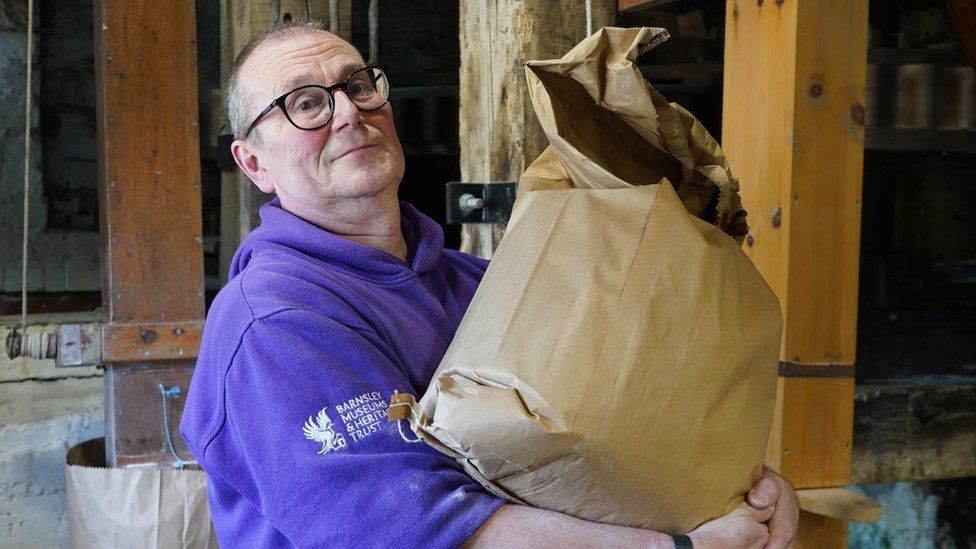Worsbrough miller embraces 'daily grind' after quitting teaching job
- Published

Much of the work Simon Dodd does at Worsbrough Mill has been unchanged for centuries
Making sure the stones keep turning in a 400-year-old flour mill might sound to some people like a fantastic way to escape the pressures of the 21st Century.
But for ex-teacher Simon Dodd it is a reality, and often hard work, after he became head miller at Barnsley's 17th Century Worsbrough Mill in 2018.
It was a dream come true, though, according to Simon, who adds that he could never have predicted what it would be like to run a piece of history.
Simon says he had previously worked in education for 27 years, teaching a variety of subjects at schools in Cumbria.
While there, he says he helped a friend at a traditional mill - and as a result had become hooked.
"I loved it, but couldn't afford to leave education at that point," he says.
Worsbrough Mill's pond is only big enough to keep the mill wheel turning for a while, so a huge reservoir nearby is needed
However, when he later saw an online ad for the job at Worsbrough Mill, he decided it was a once-in-a-lifetime opportunity.
"My initial thought was, I've got to go for this," he says.
"I remember at the interview being asked a question and me just saying, 'the reason I've gone for it is that it's my dream job'."
As the successful candidate, Simon's role is now to keep the waterwheel at the mill turning five days a week, making sure freshly-milled flour can be shipped to bakeries and kitchens across the country.
The mill - the oldest part of which dates back to 1625 - has grown over the centuries, but the process has barely changed, he says.
Traditionally, the stones usually outlast the miller before they need to be replaced
Water from the mill pond runs downhill to spin the cast iron wheel, which puts gears and pulleys in motion, turning the millstones on the first floor of the building.
Once milled, the flour then falls through a chute in the floor and is bagged.
Speaking as he works, tying a rope around the top of a brown sack of flour, Simon says it does not get fresher than that.
The organic grain milled at the site is specially selected from UK farmers to produce only the best flour, he adds.
The wholegrain flour is made using traditional stones in the mill
Some of it is used at the Worsbrough Mill cafe but, according to Simon, the Covid pandemic saw sales to bakers rocket.
While many people were baking loaves in their kitchens during lockdown, commercial and artisan bakeries were trying to react to the demand, buying in bags of Worsbrough's white stuff.
While, 12 tonnes of grain were milled there in 2019, more than 24 tonnes were turned into flour there in 2020 - the first year of the pandemic.
Meanwhile, that number jumped further in 2021 to 56 tonnes, according to Simon.
"The vast majority of that went out to bakeries across the country on pallets rather than in the back of a van," he says, adding that the customer base has changed dramatically since he started.
Visitors to the mill can see Simon at work on certain days
While it used to be dominated by people buying small bags for the pantry, that had to change, he says.
After all, his job is not only to keep the tradition alive, but to make the mill profitable.
Simon says: "The biggest learning situation is actually learning how to mill day after day, to do the daily grind, and how to try and make it profitable.
"But it's also to understand this building and the machinery. It's pretty unique."
The cast iron mill wheel has been turning here for decades
Worsbrough Mill has certainly seen a lot of change.
Originally fed by the small mill pond and river, Worsbrough Reservoir was built in 1793.
The mill was expanded in the 1840s as the industrial revolution was in full swing, but the water wheel is still seen as the long-term solution, even if it is slightly unreliable.
Recent work on the reservoir - parts of the banking were falling in, putting anglers at risk - meant milling had to be halted for 15 months.
But after a £2.4m engineering scheme was undertaken, during which the water levels were too low to feed the water wheel, the stones are turning once again.
The reservoir feeds the mill pond with water to keep the wheel moving, just like it did in the 1800s
Simon says that, for him, "it's about making sure the building is maintained".
"To last another 400 years would be lovely," he adds.
"But it's also the skills and the sort of the understanding of the building and the technology.
"That's the bit that will die before the building will die, if we're not careful."
However, Simon says he certainly has no regrets at all about his move from the world of teaching to the ancient art of milling.
"I have to say, it's a delight to be the current curator of this building."
Follow BBC Yorkshire on Facebook, external, Twitter, external and Instagram, external. Send your story ideas to yorkslincs.news@bbc.co.uk, external.
Related Topics
- Published3 September 2018